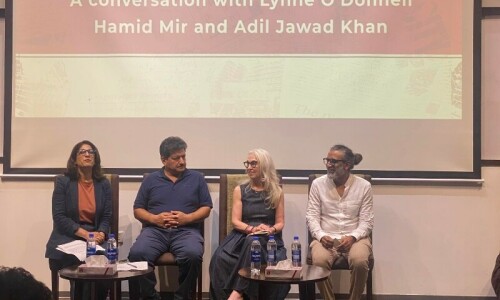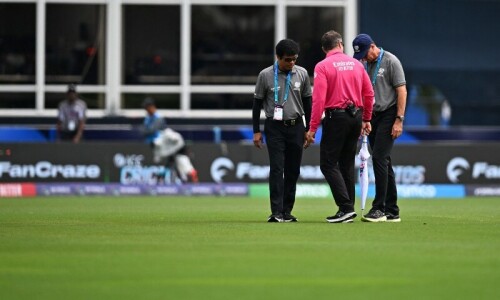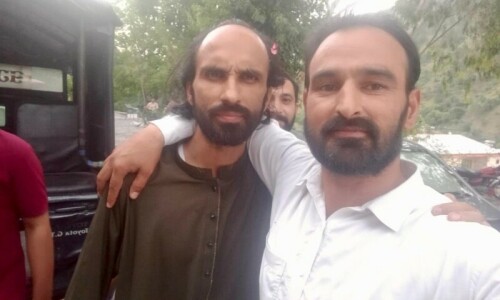ONLY a few of Pashto writers have proved their mettle in different genres of literature while most of them are known for their grip over a certain subject. In the world literature, too, it is considered appropriate for a writer to keep himself limited to the genre towards which he has a natural tendency.
Although sometimes some senior Pashto writers are heard complaining about others, who, according to them, lay their hands on every subject without restricting themselves to their field of expertise. “If a playwright begins to compose poetry, it may not be up to the mark. So he should keep writing plays instead of doing new experiments,” a senior and renowned writer once said.
However, Noorul Bashar Naveed has the distinction that he can write a poem and an analytical article with the same easiness and prudence with which he writes a drama serial for the silver screen or theatre.He is one of the most popular playwrights of Pashto language. His dramas are mostly focused on social issues and Pakhtun society. The witty and meaningful dialogues of his strong characters keep the viewers spellbound.
“We (Pakhtuns) have only three writers, who can compete with the playwrights of any other language and Noorul Bashar Naveed is one of them. The others two are Dr Mohammad Azam Azam (late) and Saadullah Jan Barq,” says Abdul Wakil Sulamal Shinwari, himself a drama and short story writer.
But at the same time, Noorul Bashar Naveed is also a workaholic journalist of Pashto language. He is distinguished by his peculiar style of column writing. The readers, who are accustomed to his writings, can recognise his column even if it is published without carrying his name.
His column Ma Ta Ghwag Sha (listen to me) was so popular that several people used to buy the newspaper just to read his column. His columns were later published in the form of a book in two volumes.
“I have witnessed the power of Bashar’s pen. One of my ‘careless’ friends once borrowed the book of Bashar’s columns from me. The next morning the wife of my friend brought back the book to our house and yelled at me as to what was written in the book as her husband literally burst into tears while reading it,” recalls Baz Mohammad Abid, a renowned Pashto poet.
After working for several years in a Pashto newspaper, Bashar Naveed launched his own monthly magazine Leekwal (the writer). Being a ‘former’ political activist, he specified a major portion of the magazine for politics. However, literature is also given due space in it. Despite facing financial problems, his ego and determination never allowed him to close the magazine and disappoint his fans.
Being a progressive nationalist and politically aware writer, the poetry of Bashar Naveed is also a depiction of Pakhtun society. His poems and even ghazals are replete with symbols, allegories and similes to describe the situation of the region. The realism in his poetry is evident from his below couplet.
Zharhi da zhwandoon pa tamasha kay zhwand Wadredo pakhpala janaza kay zhwand (The scene of life makes the life weep As life attends it own funeral prayers)
However, sometimes his sentiments, stirred by the incidents of terrorism and injustices, are so strong that he doesn’t bother to wrap them in the clothes of symbols and similes.
In some of his poems like Bacha Khan Ta Shikayat (a complaint to Bacha Khan), Da Kabul Da Karghano Daawat (invitation by the crows of Kabul) and Aay Pekhawara (O Peshawar), the sentiments of Bashar Naveed seem to be on peak.
Though his poetry is a wailing on the tragedy of Pakhtuns, yet it also has sufficient colours of romance and love. Like, he says:
Ma yo khukaly nom pa zor da zana her krho Ma yo bal da zahro goot da halqa ter krho Za da yar da harkali dasay aadat wom Khpal lasoona may da zana ra chaper khro (I forced myself to forget a beautiful name I gulped another drop of poison I was accustomed to be greeted by my beloved So I hugged myself)
Being a realist poet, Bashar Naveed sometimes borrows new terminology and similes from the day-to-day happenings.
Somra pa bay rahma qatal wazhni ma Stargay day qataly Talibanay di (Like the Taliban killers How mercilessly your killer eyes kill me)
Bashar Naveed himself considers poetry a refuge from the fatigue of prose writing and writes prose to earn his livelihood. “These poems have forced me to write them,” he says in the foreword of his newly-published poetry book Zol au Mashaloona (the wind and the lamps).
Born on February 12, 1956 in Rashidabad area of Toru in Mardan, Bashar Naveed got his initial education in his village. His published books include Mashaloona (lamps), a collection of his poetry published in Kabul in 1998, two volumes of his columns and a prose book Watan ya Kafan (motherland or coffin). His newly-published book Zol au Mashaloona also contains some of his poems from his earlier book.
Although the government has awarded him Pride of Performance for his contribution to Pashto literature, yet Noorul Bashar Naveed has not been given his due place owing mainly to his harsh criticism on political parties for their mistakes.










































Dear visitor, the comments section is undergoing an overhaul and will return soon.